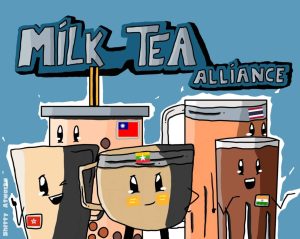The visit of U.S. House Speaker Pelosi to Taiwan on August 2-3 sparked a diplomatic uproar, and may well have long-term implications for security in the region. Less noticed, however, is how the event has also revived online clashes between Chinese netizens and those within the region sympathizing with Taiwanese independence struggles.
Pelosi is the highest-ranking active member of the U.S. government to visit Taiwan in 25 years. While China was undoubtedly the primary target of her political messaging, Pelosi went beyond Taiwan to include human rights and democracy in general. She met human rights advocates and also stated in her speech that “America’s determination to preserve democracy here in Taiwan and around the world remains ironclad.”
This framing has repercussions beyond immediate diplomatic or security concerns. By drawing the underlying link between Chinese foreign policy on one hand, and democracy and human rights on the other, Pelosi’s visit to Taiwan has also revived the Milk Tea Alliance – a transnational movement based on solidarity between supporters of democracy in the region.
Coined in 2020, the term Milk Tea Alliance emerged from online squabbles between Chinese and Thai netizens over the sovereignty of Taiwan and Hong Kong. The clashes online quickly expanded to include other issues surrounding China’s undemocratic practices, such as human rights violations in Xinjiang and Tibet. The term was swiftly integrated into the language and identity of several ongoing pro-democracy movements in the region, including in Hong Kong, Taiwan, Thailand, and later Myanmar after the February 2021 coup.
Sharing similar experiences under authoritarian regimes, protestors from these countries started to show support for demonstrators in other countries and formed a loose online transnational network. Milk tea, a popular drink in these countries, was used as a symbol of unity among those calling for human rights and democracy in the region.
The movement had lost momentum following the subsiding of mass demonstrations in Hong Kong, Thailand, and Myanmar. However, Pelosi’s visit to Taiwan has given it new life, with the hashtags #MilkTeaAlliance, #ไต้หวัน (#Taiwan), and #TaiwanIsaCountry trending on Twitter, especially in Thailand.
The spark occurred on Wednesday, the day of the visit, when the Chinese Embassy in Bangkok posted on its Facebook page calling for support from the Thai government, as “a friend of China… to support China’s effort in protecting its sovereignty and territorial integrity… and great mission of reunification.” The Thai Ministry of Foreign Affairs have also officially announced its endorsement of the One-China policy.
Responding to these developments, the online world, particularly Twitter, witnessed a number of fights between Chinese and Thai netizens. The language in these tweets was drawn from various sources, including U.S.-based anti-China rhetoric. In response to several tweets written in broken Thai claiming that Taiwan was part of China, Thai netizens, believing that they were by Chinese internet users, struck back by asserting that the only thing belonging to China was COVID-19.
Social media activists have also tapped into pop culture, demonstrating the youthful demography of the Milk Tea Alliance. Memes have been utilized to delegitimize the claim of Chinese nationalists over Taiwan’s sovereignty, including mocking Xi Jinping as Winnie the Pooh and comparing Chinese nationalists to Hela, a villainess from the recent film “Thor.” A few satirical maps describing China as “West Taiwan” or “South Mongolia” and “North Hong Kong” are also trending.
These posts were retweeted and endorsed by netizens across the region using the #MilkTeaAlliance hashtag. In appreciation, the Taiwan Digital Diplomacy Association tweeted an illustration of the Milk Tea Alliance to thank Thai netizens for showing solidarity against the One-China policy.
While military exercises and diplomatic maneuvers have rightly occupied the attention of most analysts, they should not lose sight of the developments on social media. While some have argued that Pelosi’s visit to Taiwan was nothing more than a symbolic victory, this symbolism has been felt not only among Taiwanese but also shared with those in the region fighting for democracy and freedom. This might in turn further embolden their movements.
These online activities between pro- and anti-China netizens should not be dismissed merely as a trivial internet fight. Social media allows for idea sharing and solidarity formation, especially in countries where authoritarian governments routinely punish street demonstrations. These platforms could also provide an avenue for citizens to pressure governments to adjust their foreign policy, which has traditionally been an elite preoccupation. But for now, how things develop online, and how it affects regional politics, remains an open question.

































